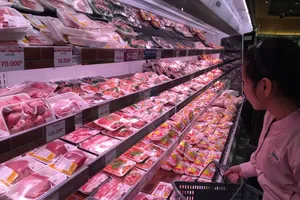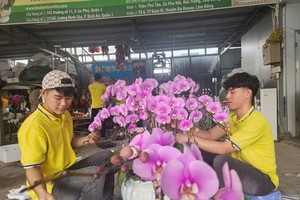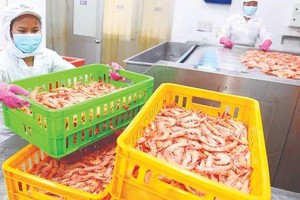 A grape growing area in Ninh Thuan Province. (Photo: SGGP)
A grape growing area in Ninh Thuan Province. (Photo: SGGP)
The county’s largest grape producing province has favorable weather and soil for growing grapes, and has more than 1,200ha under the fruit and an annual output of 30,000 tons. Most of the varieties are table grapes.
Farmers in the province grow mostly two table grape varieties - Red cardinal and NH01-48, with the former accounting for 80 percent of the province’s grape growing area.
Though demand for producing wine in the province and neighboring provinces is high, wine grape varieties account for only a small area.
To meet the demand for wine grapes, the province People’s Committee has instructed the Nha Ho Research Institute for Cotton and Agriculture Development to preserve a gene database of 143 grape varieties.
From the database the institute has selected many high-yield and -quality wine grape varieties that can grow well in the province and cultivates them.
Phan Cong Kien, deputy head of the institute, said: “The institute has transferred three types of wine grape varieties for cultivating on a commercial purpose so far,” referring to NH02-90 and NH02-97 for producing red wine and NH02-37 for producing white wine.
NH02-90, Syrah grape has been recognized for commercial cultivation by the Ministry of Agriculture and Rural Development.
It is highly resistant to diseases, adapts to dry and hot weather, has an average yield of 12 – 16 tons per hectare per crop, and is appropriate for making wine.
The other two are in the process of completing procedures for recognition under the Cultivation Law for commercial cultivation.
Kien said the three could be grown in many soil types. “The institute is also growing on a pilot basis other wine grape varieties like NH02-66, NH02-137 and NH02-145.”
Dang Kim Cuong, Director of the provincial Department of Agriculture and Rural Development, said to increase the value of grapes his agency would continue to work with research institutes and agencies to create new varieties, including table and wine grapes resistant to pests and have high yield and quality.
Besides producing table grapes, the province is focusing on research into making other products from the fruit, he added.
The department is working with localities to create plans and zoning areas for growing wine grapes to ensure steady supply.
It is also mobilizing investments and creating conditions for farmers to sign contracts with companies and co-operatives to grow grapes and produce wine under value chains.
Farmers in the province grow mostly two table grape varieties - Red cardinal and NH01-48, with the former accounting for 80 percent of the province’s grape growing area.
Though demand for producing wine in the province and neighboring provinces is high, wine grape varieties account for only a small area.
To meet the demand for wine grapes, the province People’s Committee has instructed the Nha Ho Research Institute for Cotton and Agriculture Development to preserve a gene database of 143 grape varieties.
From the database the institute has selected many high-yield and -quality wine grape varieties that can grow well in the province and cultivates them.
Phan Cong Kien, deputy head of the institute, said: “The institute has transferred three types of wine grape varieties for cultivating on a commercial purpose so far,” referring to NH02-90 and NH02-97 for producing red wine and NH02-37 for producing white wine.
NH02-90, Syrah grape has been recognized for commercial cultivation by the Ministry of Agriculture and Rural Development.
It is highly resistant to diseases, adapts to dry and hot weather, has an average yield of 12 – 16 tons per hectare per crop, and is appropriate for making wine.
The other two are in the process of completing procedures for recognition under the Cultivation Law for commercial cultivation.
Kien said the three could be grown in many soil types. “The institute is also growing on a pilot basis other wine grape varieties like NH02-66, NH02-137 and NH02-145.”
Dang Kim Cuong, Director of the provincial Department of Agriculture and Rural Development, said to increase the value of grapes his agency would continue to work with research institutes and agencies to create new varieties, including table and wine grapes resistant to pests and have high yield and quality.
Besides producing table grapes, the province is focusing on research into making other products from the fruit, he added.
The department is working with localities to create plans and zoning areas for growing wine grapes to ensure steady supply.
It is also mobilizing investments and creating conditions for farmers to sign contracts with companies and co-operatives to grow grapes and produce wine under value chains.
























